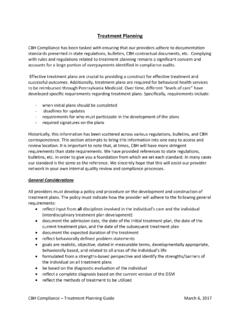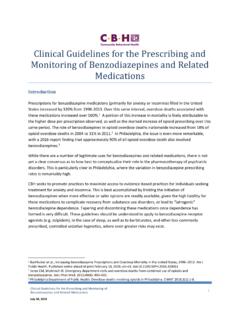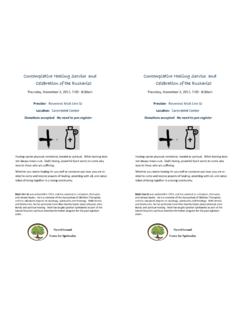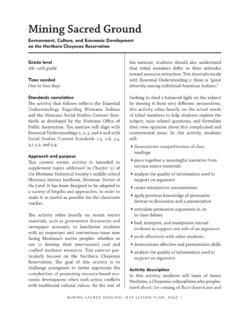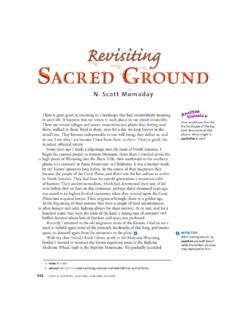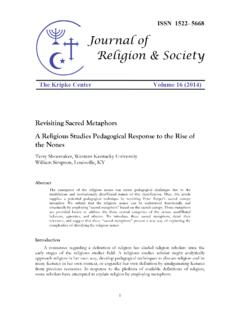Transcription of Standing on Sacred Ground - DBHIDS
1 Standing on Sacred Ground : Advancing the Integration of Spirituality and Behavioral Health Rabbi Elisa Goldberg Spirituality: A Working Definition Spirituality is an essential part of human experience that represents the part of us which seeks transcendent experiences, and recognizes that a force exists beyond the material world. Spirituality: Encourages hope and purpose, can foster positive emotions, coping skills, and recovery in the face of behavioral health challenges. 89 % Believe in God or a universal spirit 70-85% Pray regularly for good or better health 22% of people identify as unaffiliated From the 2013 Pew Study on Religion in America What We Believe in the US Research on the Impact of Spiritual Care on Behavioral Health Outcomes Belief in God was associated with greater reduction of depression and self-harm and better treatment outcomes (Rosmarin 2013) Prolonged periods of spiritual struggle can lengthen hospitalizations (Fitchett et al, 2004) Ethnic minorities and the elderly are particularly likely to utilize religious coping following trauma (Bryant-David, 2013)
2 88% of psychiatric patients reported three or more current religious needs, had lower spiritual well-being scores and were less likely to have talked with their clergy. (Fitchett, 1997) Why Address Spirituality? While the vast majority of people with behavioral health challenges report spiritual needs, most of those needs go unmet Few programs/clinicians are equipped to address spiritual/religious issues with clients Religion and spirituality influence an individual s ability to cope with their behavioral health challenges Spirituality Helps a positive world view to make sense of difficult situations purpose and meaning maladaptive coping social support other-directedness to release the need for control and encourages forgiveness thankfulness hope From Faith and Mental Health, by Dr.
3 Harold Koenig Spiritual Care Help people access their own spirituality as a source of strength Identify negative beliefs and spiritual dilemmas that create pain Develop supportive beliefs and resolve spiritual contradictions Bring awareness to the spiritual dimension of life Address human need for meaning, wholeness, and connection Connect to deepest values, beliefs, and hopes for the future Provide opportunity to make meaning out of life s losses and limitations. FACT: Spiritual Assessment (LaRocca-Pitts, 2008) F Faith (or Beliefs): What things do you believe that give your life meaning and purpose. A Active (or Available, Accessible, Applicable): Are you currently Active in your faith community?
4 Is support for your faith Available to you? C Coping (or Comfort); Conflicts (or Concerns): How are you Coping? Are your faith/beliefs helping you Cope and find comfort? Has your current situation created Conflicts in your beliefs? T Treatment plan: 1) Support positive coping, 2) provide direct spiritual support, 3) encourage patient to address these concerns with their own faith leader, or 4) make a referral to the hospital chaplain for further assessment. Can spirituality be harmful? Questions to assess healthy and unhealthy beliefs: Do beliefs cause pain, suffering, and stress or peace and acceptance? Do beliefs help one connect to community, hope, justice or morals?
5 Do beliefs foster a sense of interconnectedness? Do beliefs reinforce self-centeredness or connection to other people? Remember these questions are just the beginning of a dialogue that takes into account the wide variety of spiritual, religious, and cultural norms. Standing on Sacred Ground Training Our goal is to improve the ability of behavioral health practitioners to provide effective treatment through the understanding and integration of spirituality in clinical care. In order to increase quality of life for people living with behavioral health challenges. Individual Training Goals Understand the diverse nature of spiritual experience and the spiritual development.
6 Including the difference between spirituality and religion Identify the key ways spirituality/faith support and/or hinder the recovery process Utilize basic spirituality assessment tools and treatment skills to particular therapeutic contexts Develop capacity for reflective practice to manage religious countertransference Organizational Training Goals Assess current utilization of behavioral health practices that integrate spirituality Identify core spiritual competencies needed with in agency services for training purposes Adopt standards of care that reflect evidence-based research on the impact of spirituality on behavioral health Provide spiritually-informed clinical practice throughout service delivery centers Training components Awareness - Assessment Implementation Internal Change Team: Organizational assessment (SWOT) Develop organizational objectives Identify implementation strategies Provide leadership Project Implementation Convening Session with Change Team Clinical Training full-day Agency-Wide Awareness Training 2 hours Ongoing Technical Assistance/Case Consultation Evaluation Background Standing on Sacred Ground : Integrating Spirituality and Behavioral Health Care, presented at.
7 OThe Alliance of Community Service Providers 2014 oDBHIDS Conference on Faith and Spirituality - 2014, 2015 oFriends Hospital - 2013, 2015 Integrating Spirituality in Clinical Practice, presented at: oNational Association of Jewish Chaplains 2008 oAssociation of Jewish Family and Children's Services - 2014 A Guide to Leading Spirituality Support Groups in Behavioral Health Care Settings, Drexel University's School of Public Health, 2014 The Team Rev. Dandridge Collins, Pastoral Counseling Network *Rev. Caroline Cupp Chaplain at Friends Hospital Rev. Wally Fletcher, Neumann University Rabbi Elisa Goldberg, Community Chaplain *Dr. Elizabeth Hernandez, Place of Refuge Rev.
8 Edward Kane - NAMI Dr. Phillip Monroe, PsyD Biblical Seminary, Grad. Sch. of Counseling Sahir Muhammad, - Behavioral Specialist Joseph Rogers - Chief Advocacy Officer, MHASP * No longer active members Contact information Rabbi Elisa Goldberg Materials mentioned in this talk can be found in A Guide to Leading Spirituality Support Groups in Behavioral Health Care Settings published by Drexel University School of Public Health.


